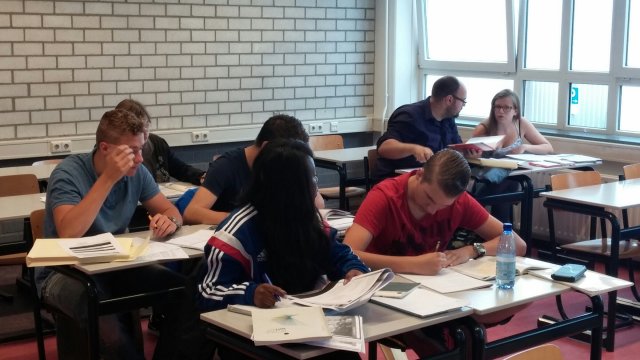Zomerscholen helpen zittenblijven tegen te gaan
Zomerscholen tegen zittenblijven blijken effectief. In 2013 en 2014 zijn door CNV Onderwijs en de VO-raad pilots gestart om onnodig zittenblijven tegen te gaan. Onderzoekers Sytske Faber, Greetje Timmerman en Anne Kievitsbosch van de Rijksuniversiteit Groningen vergeleken de effecten van de twee pilotjaren .
Blijvend positief effect
Van de 241 leerlingen die in 2013 een zomerschool volgden ging 85% alsnog over, van die groep is 75% van de leerlingen in het volgende schooljaar opnieuw bevorderd, of geslaagd voor het examen . Uit het onderzoek blijkt nu dat het effect na één jaar nog steeds positief is. Het onderzoek van Faber, Timmerman en Kievitsbosch vond plaats in 2014 op 15 scholen voor voortgezet onderwijs, waar in totaal 320 leerlingen deelnamen aan de zomerschool. Na afloop zijn 276 leerlingen (86%) alsnog bevorderd naar het volgende leerjaar. In vergelijking met 2013 is dit slagingspercentage ongeveer gelijk (85%).

Toets
De leerlingen nemen deel aan de zomerschool gedurende twee weken. Ze werken in kleine groepen van max. 6 leerlingen onder begeleiding van een (externe) zomerschooldocent en sluiten de zomerschool per vak af met een toets.
Vooral HAVO leerlingen
De zomerschool is effectief tegen zittenblijven in alle leerjaren van het voortgezet onderwijs, maar vooral voor havoleerlingen in het 4de leerjaar. Van alle deelnemende scholieren was 50% havoleerling en van deze groep leerlingen zat 71% in havo-4. Havo-4-leerlingen zijn dus oververtegenwoordigd als deelnemers aan de zomerschool. De meest gekozen vakken voor de zomerschool zijn de zogenaamde kernvakken: wiskunde (33%), Nederlands (13%) en Engels (11%).
Meer jongens dan meisjes
De verdeling van het aantal geslaagde jongens en meisjes is 61% versus 39%. Deze percentages komen overeen met de verdeling van het totaal aantal jongens en meisjes dat deelgenomen heeft. Van de geslaagden zat 31% in het VMBO, 48% in het HAVO en 21% in VWO/Gymnasium (19%, resp. 2%).
Financieel succes
De zomerschool is behalve een educatief, ook een financieel succes. Zittenblijven is een dure aangelegenheid, want kost ongeveer 7400 euro per zittenblijver. Deelnemen aan de zomerschool kost 650 euro per leerling. Het verschil in kosten is aanzienlijk: de 12 tot 15 zomerscholen die met 250-300 leerlingen meededen aan de experimenten in 2013 en 2014 leverden rond de 1 miljoen euro op (per jaar).
Meer informatie
- Rapport - De zomerschool: een effectieve interventie tegen zittenblijven (S.E. Faber MSc.; Prof.dr. M.C. Timmerman; A.F. Kievitsbosch MSc.)
- Voor meer informatie kan contact opnemen worden met Greetje Timmerman, telefoon 050-3636235, m.c.timmerman rug.nl
Meer nieuws
-
08 december 2025
Burgerparticipatie onmisbaar voor een duurzame energietoekomst
-
23 oktober 2025
Negen wetenschappers van de RUG ontvangen Vidi-beurs
